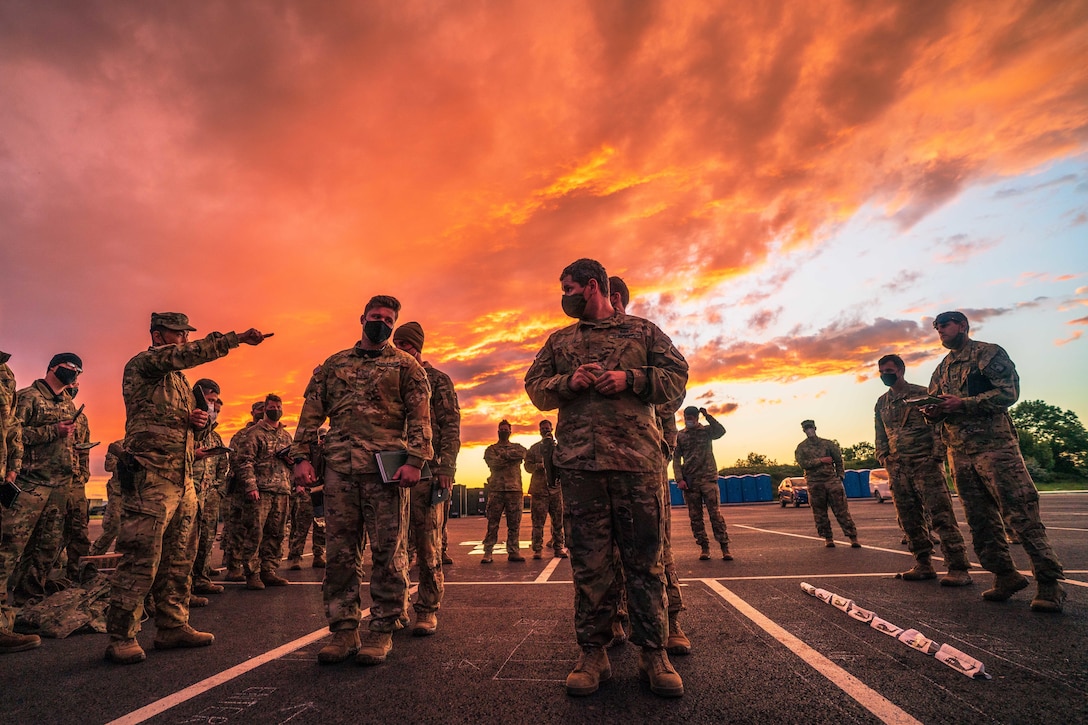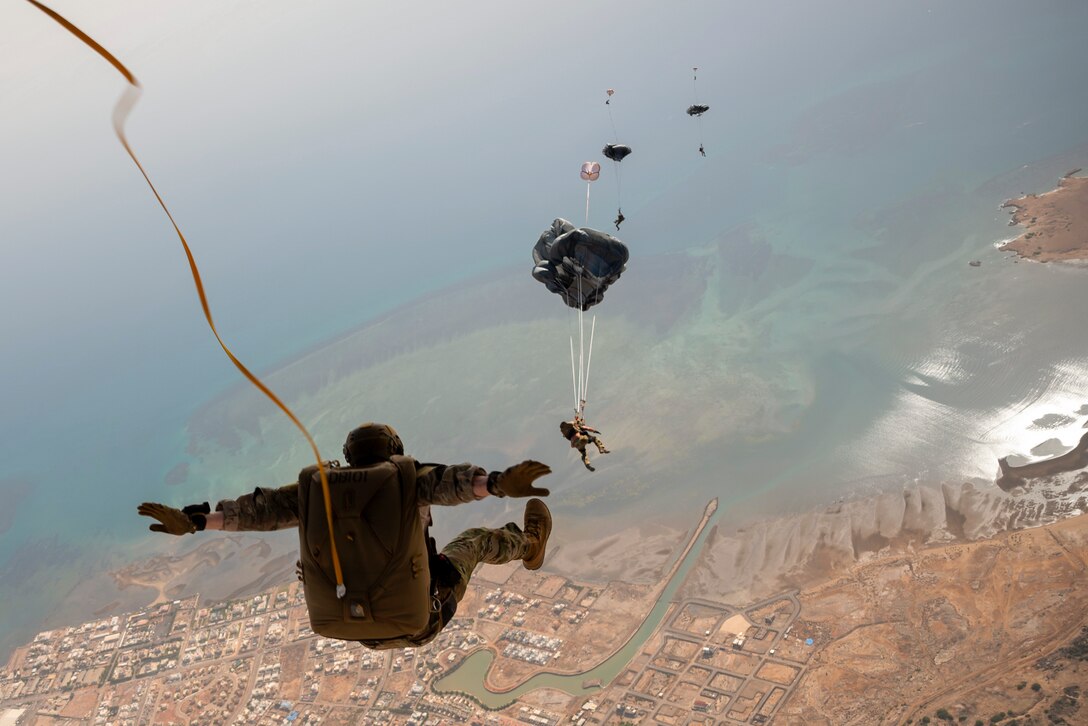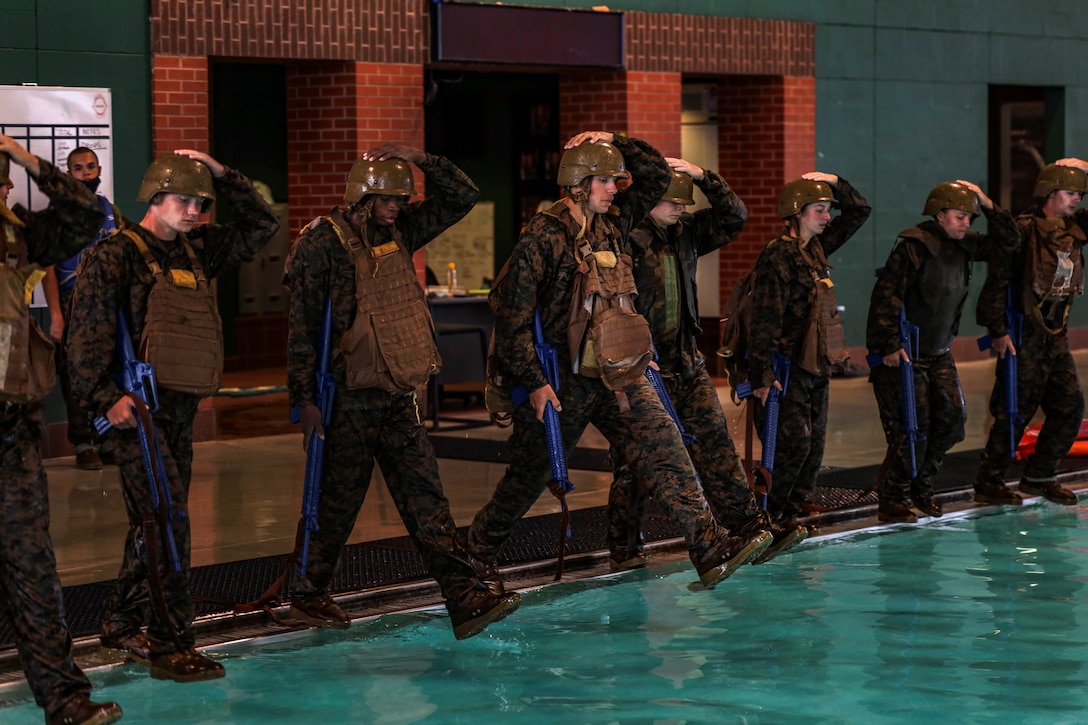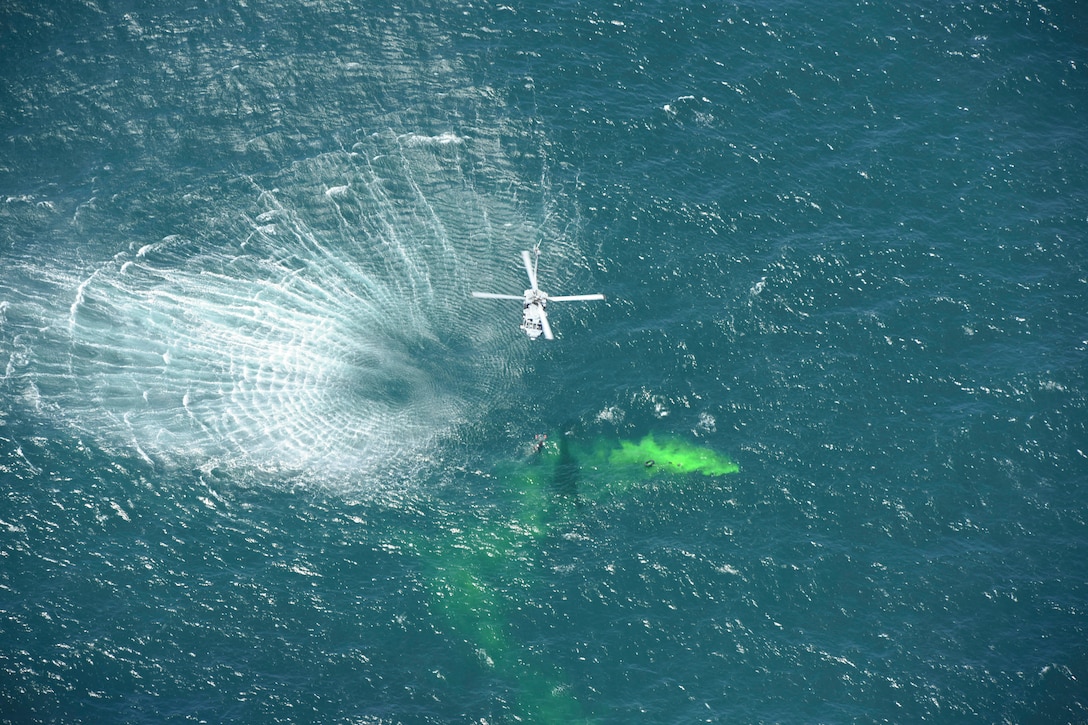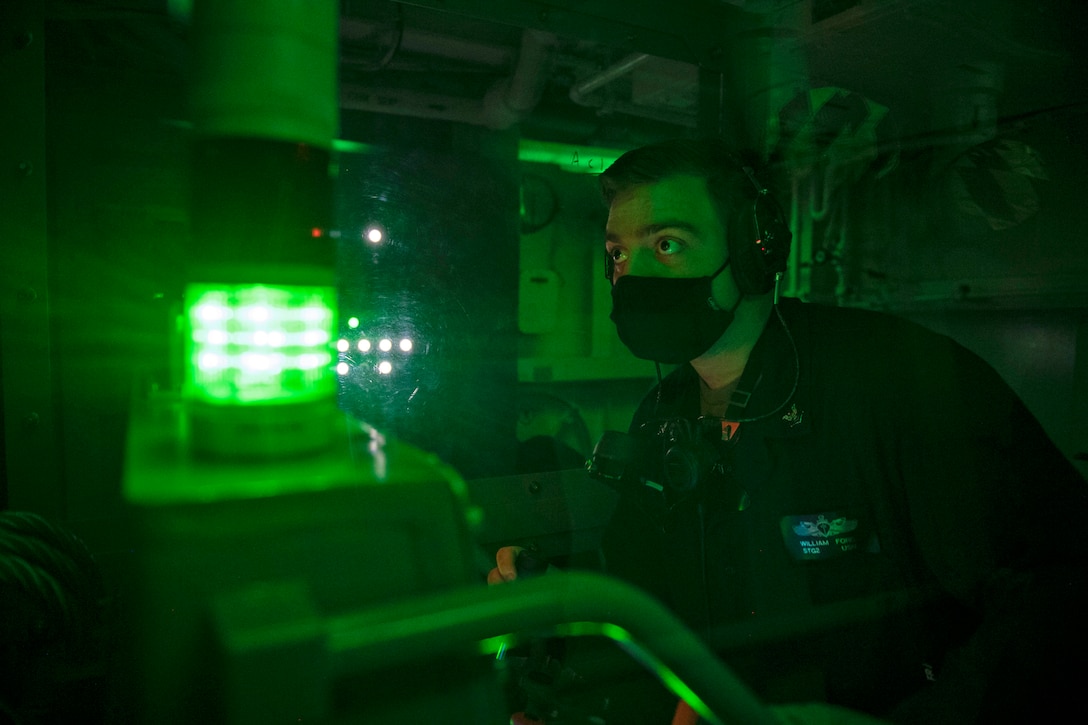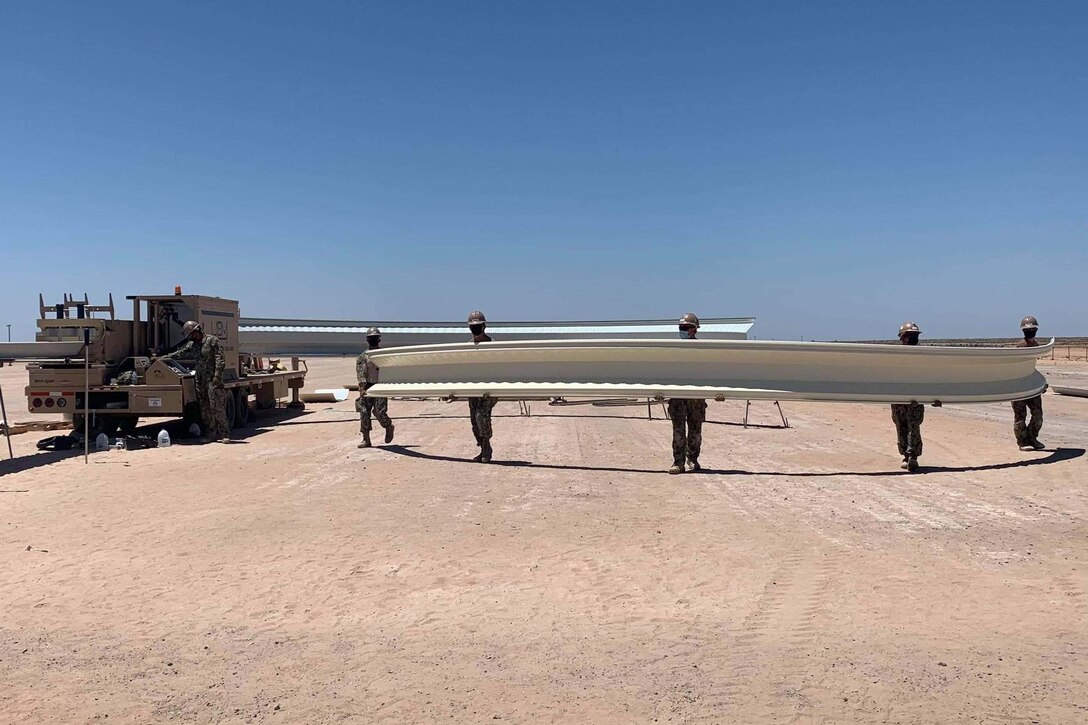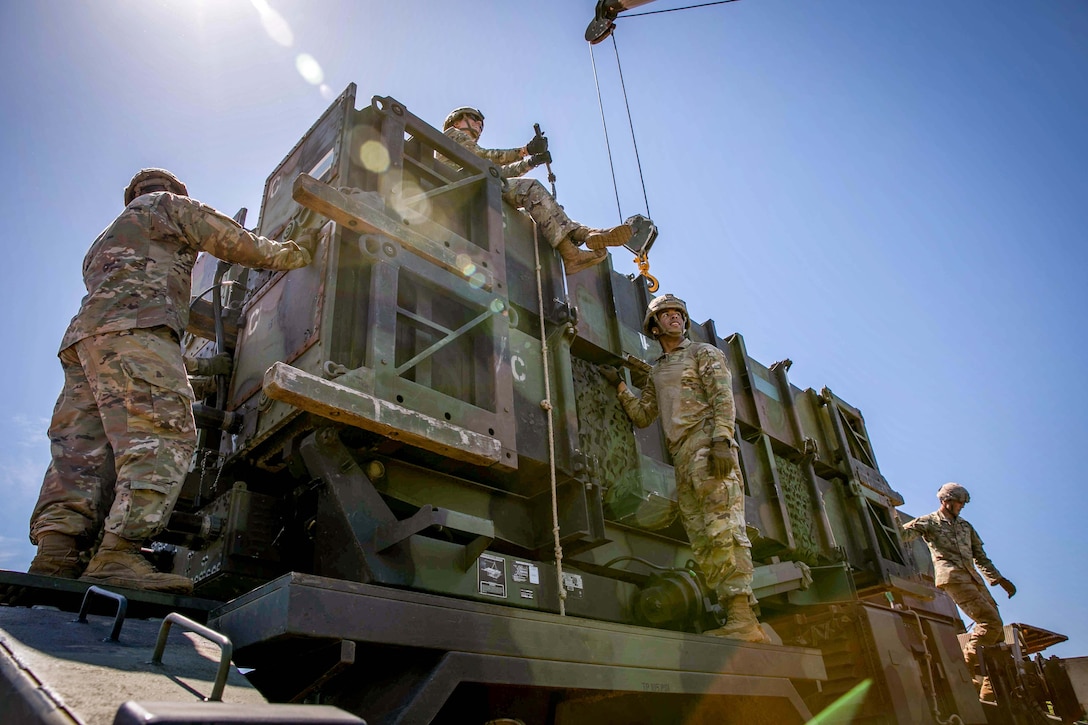Pentagon Press Secretary John F. Kirby
PRESS SECRETARY JOHN F. KIRBY: Just a couple of
things at the top, and then we'll get at it. I think you saw that the
secretary spoke again with his Israeli counterpart this morning,
Benjamin Gantz. The secretary again reiterated our unwavering support
for Israel's right to defend itself, and to protect Israeli citizens and
civilians. And he of course lamented the loss of innocent Israeli and
Palestinian lives.
He expressed his support for de-escalation of the conflict and for
the restoration of calm. But, again, I think you guys already saw our --
our readout.
On to Defender Europe 21, the big exercise over in Europe. Over the
weekend, Defender-linked Exercise Swift Response wrapped up in Romania
with a joint air assault led by the Royal Netherlands Army. U.S.
Chinook, Black Hawk and Apache pilots joined Romanian Pumas to transport
equipment and Dutch forces across training bases.
Yesterday, Immediate Response – also part of Defender – began;
Exercise Immediate Response. More than 5,000 troops from a dozen
countries will conduct live-fire exercises across 31 training areas
until the first of June.
The European Command commander, Gen. Wolters, will be traveling to
Slovenia this week as well, to attend a distinguished visitor day to
look more at the exercise.
Yesterday, U.S. Strategic Command led Operation Apex Charger, where
six long-range strategic bombers conducted a global air power projection
event to demonstrate our commitment to collective defense, and to
integrate geographic combatant command operations and activities.
U.S. Air Force bombers operating from multiple locations around the
globe integrated with NATO allies and partners in the Arctic, North
America, Europe, and in the Indo-Pacific region. This mission
demonstrates our ability to command and control bomber forces to support
assigned missions anywhere at any time in support of our defense
strategic objectives.
Beginning today – separate topic – beginning today, the Department of
Defense and the Department of Veteran Affairs are hosting the 2021 DOD
V.A. Suicide Prevention Conference, and we're doing this virtually. Both
the secretary and Chairman Milley offered remarks, which will be
available on Defense.gov if they aren't already.
The secretary expressed his regret, of course, in these remarks, over
the tragic loss of brave men and women to suicide, and the grief that
their families continue to suffer as a result. And he expressed his
commitment to doing everything that he can – and we can as a department –
to change the lingering stigma around asking for mental health support.
That conference will take place, again, starting today through the
20th.
Over the next few weeks, in coordination with FEMA and state and
local officials, several DOD-supported community vaccine centers will be
mission-complete – in other words, done – and will begin reducing
personnel as the – as the sites reassess the size of the vaccination
support teams that are going to be needed.
And we're very proud and very grateful of the support that our
service members, both active duty and National Guard, have provided to
help combat the pandemic, including administering over one – I'm sorry –
15 – I’ve got to make sure I get my glasses; I can't tell if there's a
decimal point in there – 15 million vaccines to the American public at
over 900 sites.
As of today, we are providing support to 30 vaccine sites through
3,289 personnel, including 1,390 vaccinators. So we're still at 30
teams, but I think over the coming days and coming weeks, you'll start
to see those teams reduce in size as more and more people are electing
to get the vaccine.
On personnel-related issues, this week, we onboarded two other
DASD-level individuals: Heather King, the deputy assistant secretary of
Defense for Homeland Defense, and Integration and Defense Support of
Civil Authorities checked on board, and Maynard Holliday, director of
Defense Research and Engineering for Modernization is also here. We're
glad to have them on the team. That would bring our total of appointees
to 112.
Now, a COVID mask reminder. Last week, I think you saw the deputy
secretary updated mask-wearing guidance for the Pentagon Reservation.
DOD employees who are fully vaccinated do not have to wear masks. Now,
that's fully vaccinated, means, you know, after your second shot, plus
two weeks. However, those who are not fully vaccinated must continue
wearing a mask to protect themselves and others.
All other force health protection guidance remains the same in terms
of social distancing, hygiene, and certainly we'll keep you informed if
any of that changes.
Finally, looking ahead, on Thursday of this week, you're going to
notice an increase in helicopter activity around the Reservation and the
National Capital Region. This is, again, due to a regularly scheduled
exercise. I think you saw part of that exercise playing out yesterday.
And again, we'll see another round of it on -- on Thursday.
And with that, Bob?
Q: Hi, got a question for you on Afghanistan. Zal Khalilzad’s
testimony today on the Hill, he said that the withdrawal is proceeding
without any significant interference from the Taliban and that he
expects that to continue to be the case.
Now, I know, early on, at the beginning, you said you assumed there
would be attempts by the Taliban to interfere. I'm wondering if you've
changed your assessment?
MR. KIRBY: We would agree that thus far, the retrograde continues at
pace, the withdrawal continues at pace with nothing more than some minor
harassing attacks that have had no impact, so we agree with that
assessment.
We -- we certainly hope that that remains the case, going forward.
But, Bob, we're not going to take anything just on hope and face value.
We have to assume and we have to plan for the potential that -- that it
could be resisted, it could be opposed by the Taliban. So we're --
continuing to take all the right precautions, make sure that Gen. Miller
has all the options at his disposal to be able to do this safely.
Abraham?
Q: Yeah, thanks. Could you shed some light on this reporting about a
pilot program screening social media content for extremist material? And
what Bishop Garrison's role might be on this?
MR. KIRBY: I think there's some misreporting on this, Abraham.
Actually I don't think there's been misreporting, I know there's been
misreporting. There's no pilot program ring run by Mr. Garrison or the
extremist working group to -- to examine social media.
Mr. Garrison is leading the extremist working group on a number of
efforts to try to help us come to grips with learning how -- what the
scope and scale of the problem of extremist activity in the ranks really
is, and helping us divine some potential solutions, going forward.
For instance, you know, how much and to what degree do we need to
train future veterans about these groups as they try to recruit them,
going forward. How do we get a better sense of the data collection
possibilities here in terms of really understanding the true size of the
issue. And doing a separate study on the -- on the degree to which
extremism exists inside the ranks.
He's not rewriting policy. It's a working group, designed to tee up
options and ideas and recommendations to the secretary, and that work
continues. So there is no -- you know, there's no pilot program that I'm
aware of, certainly none inside the extremist working group, to -- to
champion some sort of new approach to look at social media.
I would remind you -- and I think you know this -- that we already
take a look at the social media footprint when we are considering
recruits as they come in. Many of the services do that -- in fact, I
think all of them do that, which is just good common sense.
And we do have -- and there has – for a long time, well predates the
extremist working group – an insider threat program here at the Pentagon
that we're always looking to improve. And part of that insider threat
program is to take a look at social media activity out there so that
we're -- that we can be as informed as possible. But there's no pilot
program.
Q: When you say, "look at social media activity," of active service members beyond the vetting stage?
MR. KIRBY: If there is -- again, the insider threat, right, is, you
know, when there's a concern about the potential of a threat coming from
inside, you know, one of the things you want to do is take a look at
the social media footprint and see what's out there in the public space.
Q: So that is happening?
MR. KIRBY: That has been happening for a while. I mean, if you have
cause to be concerned about an individual or a group of individuals and
what -- and the threat that they might pose to the organization, it
would be irresponsible not to take a look at what's out there in social
media.
But it's not a -- but -- you know, just to be clear, OK? Because I
want to make it very clear to you that we're not -- the extremist
working group is not running a pilot program to look at social media.
Q: So then this purported document that's out there, could you release that document to...
(CROSSTALK)
MR. KIRBY: I haven't seen the document that's -- that's been written about.
Q: OK.
MR. KIRBY: So I can't comment on a document I haven't seen.
Q: If it exists you’ll let us see it?
MR. KIRBY: If it exists, we'll look at it and see if it's -- if it's
something that's potentially worth public release or that we could. But
I'm not going to make any promises at this point.
Q: Thank you, John.
(CROSSTALK)
MR. KIRBY: Yeah?
Q: Just to follow up, is there a private firm being employed to look at the social media accounts of service members?
MR. KIRBY: I -- I am not aware of such a contract with such a
company. And certainly there is no such contract being led by the
extremist working group or Mr. Garrison's organization.
Yeah?
Q: But all you're answering is that they're not doing it right now. I
think the question at hand is, are you considering, is the department
considering an option to engage in some different type of consistent,
constant monitoring of service members' social media?
MR. KIRBY: I'm not aware of any such effort to do that now ...
(CROSSTALK)
Q: ... I'm not asking if you're doing it now.
MR. KIRBY: I -- I know, Barb, but, I mean, this -- this -- you know, a
-- how much -- how much farther in the future do you want me to
predict? There's no effort run by the extremist working group to set
some sort of new social media monitoring policy.
We already look at the social media footprint of potential recruits
and we already have, as I answered to Abraham, an insider threat program
which does include the monitoring of social media activity, as we
should, as we must. I'm ...
(CROSSTALK)
Q: ... are you looking at an option of extending, expanding, whatever
verb you want to use, something different than what the department does
now?
MR. KIRBY: I'm -- I'm not aware of any efforts to expand what we're
doing right now, but -- but as I said at the outset, the extremist
working group is certainly going to look at the degree to which the
information environment impacts or is impacted by extremist activity.
That would include the social media landscape.
But it's -- it -- it's -- it's putting the cart well -- well before
the horse to say that we've -- that we've got some, you know, policy
we're getting ready to roll out that would -- that would dramatically
increase or expand social media monitoring.
Q: I have a quick follow up on a different subject. The secretary's
readout today of his third phone call with Benny Gantz, for the first
time, mentions the Palestinians. He has not done that in his two
previous readouts.
So I have two questions on this -- why today did the department
decide to suddenly start mention -- mentioning the Palestinians, and
what has Secretary Austin learned about the Israeli bombing of the news
-- of the building in Gaza where news organizations were housed?
MR. KIRBY: I'm not going to talk about intelligence issues. And as
for mentioning the Palestinians, I mean, there's -- I -- I -- I -- it's
not as if there was some sort of radical shift in the way the
secretary's thinking about the conflict today. We have seen casualties
on both sides -- he mentioned that in the readout -- and those
casualties continue to mount, and that's of concern to him and that's
why he -- he mentioned it on the call today and that's why it's
mentioned in -- in the readout.
(CROSSTALK)
Hang -- hang on a second, guys. Wait, guys, just hang on. I have to
get -- I know, but I haven't gotten to anybody on the phone, and if I
don't get to anybody on the phone, then I get in trouble. Let's see --
John Ismay? And you're -- oh, no, you don't have a question. Idrees,
from Reuters?
Q: Hey, John, can you hear me?
MR. KIRBY: Yeah.
Q: If I could just go back to the call Barbara was mentioning -- so
you -- it -- it -- mentioned -- you know, it's quote-unquote
"Israeli-Palestinian lives" -- so when that was brought up, what was the
context and what did Secretary Austin say? Did he say "hey, stop
killing so many civilians" or was it more of a "hey, just don't kill as
many"? I mean, it's -- it's unclear what he actually meant. And -- and
-- and I have a separate follow up.
MR. KIRBY: The secretary was clear that we don't want to see any
additional innocent civilian lives lost on either side. Who was -- go
ahead.
Q: Give us a little bit more on -- on the call, on the substance. Did
he ask his counterpart in Israel what are the things that we should not
be seeing done by the Israelis, what are the things that should be
done, or they would like to see an immediate ceasefire?
I mean, give us a little bit of -- more substance on what they talked about.
MR. KIRBY: Well, I'm not going to provide a whole lot more context
than was in the readout. I typically don't do that. But -- you want to
get that, Jim? So I'm not going to go into more detail than was in the
-- the readout.
I can tell you that the readout accurately reflected the tone, the tenor and the -- and the main gist of the phone conversation.
Q: A follow up -- is Israel receiving now any military support from the U.S. to continue its operation in Gaza?
MR. KIRBY: If you're asking me are they -- have they asked for any
additional, specific support for these operations, the answer's no.
Q: I'm asking if they are receiving any support to continue their operations.
MR. KIRBY: They have not asked for any additional support. The -- we
continue to stand by Israel's right to defend itself and it -- and its
citizens. As you know, we have a strong bilateral military relationship
with Israel and that has not changed as a result.
Jeff Schogol?
Q: Thank you. The -- the House Armed Services Committee issued a
statement about this Intercept news story, saying that "the committee
understands the Department of Defense is exploring a means of
implementing social media screening in conjunction with background
investigations. We anticipate that any social media screening would be
intended only as an additional means of vetting cleared individuals or
those seeking to obtain a security clearance, not as a tool for ongoing
surveillance of all men and women in uniform."
Can you discuss this on -- the -- these ongoing efforts to use social media screenings for background investigations?
MR. KIRBY: Not -- not any more than I -- I -- I think I've already
done, Jeff. I mean, we -- obviously we look at social media footprint
when we're bringing somebody into the service and when you get -- go up
for a security clearance -- and I've gone through several myself. I
mean, they look at just about every aspect of your life, and clearly
that includes getting online to seeing, you know, what -- what -- what
kind of a footprint you have out there and what your activity is. That
just makes good sense. And so yeah, that continues.
And as I said, we -- we have an insider threat program that, again,
would be imprudent and irresponsible if it didn't also take a look at --
at potential social media activity as a way to glean motives and -- and
intentions of individuals that might wish us harm.
The -- this is all above board, it's all transparent, it all makes
common sense. There's -- there's no effort inside this extremist working
group to somehow spy on every individual in the military or spend hours
and hours just gleaning through social media activity, just for the
sake of doing it. This isn't about some sort of surveillance program of
our own people.
What we have -- what the -- what -- what we are interested in doing
is seeing how the services are doing, and as they recruit, seeing if
there's things that can be learned, things that can be improved in that
regard, but there's -- there's -- there's not an ongoing, you know,
surveillance program going on here tied to the extremist working group.
Tom?
Q: John, back to Afghanistan. Congressmen Meeks and McCaul have asked
the Pentagon to do more to help State Department with the special
immigrant visas, to help Afghans who work for the Americans.
Can you talk about that at all? Is that something the Pentagon's
looking into? And what are you doing now to assist the State Department
in pushing these visas, if anything?
MR. KIRBY: Yeah, Tom, it's really a State Department program, and it
would -- it wouldn't be appropriate for the Defense Department to lean
in in any tangible way. Obviously -- and you've heard the secretary talk
about this -- you -- he -- he agrees with the president, that we want
to do whatever we can to help those who helped us over the last 20
years. He's committed to that, having served in that conflict himself.
But it is a State Department program and we're going to respect the
State Department's equities and their initiatives inside that program in
terms of making sure that it meets that need.
Q: Well, the chairman and the ranking member have suggested that DOD can do more. Are you saying that DOD shouldn't do more?
MR. KIRBY: I haven't see their -- I haven't seen their letter; I
haven't seen what they're asking for DOD to do. Clearly DOD is in
support for --
Q: -- (inaudible) employment verification that this particular person worked for --
MR. KIRBY: I won't get ahead of correspondence I haven't seen. But
obviously this is a State Department led program. We are in support of
it. We certainly support the effort to do what's right by these
interpreters and other individuals that helped us throughout the last 20
years.
We'll take a look at it -- I've not seen the correspondence.
Obviously we'll take a look at that and -- and we'll respond
appropriately.
Sam Lagrone.
Q: Yeah, sorry, John. Looking for the mute button.
There's been some complaints on Capitol Hill that they're not going
to have a whole lot of time to do posture hearings over the budget.
Schedule is limited. I think for a good example is the Navy's posture
hearing next Thursday is happening like four hours before the Navy
briefing, or before anybody gets to see the actual releases on the
budget.
What's the department doing to insure that the committees and
Congress writ large have the opportunities to do the oversight on the
spending bills? Thanks.
MR. KIRBY: Well, we don't control the timing of the release of the
budget. Obviously that's up to OMB. So that's out of our hands. The
secretary is absolutely committed to congressional oversight and he
understands the responsibilities that members of Congress have,
particularly on oversight of the budget.
And we will continue to work as closely and as aggressively as we can
with the committees to make sure that they have -- that they have
access to the department's leaders across the board to ask these very
important questions and to provide proper scrutiny and oversight of the
budget process.
So it's a work in process. Sam, we'll -- we'll stay latched up at
our level with -- with our oversight committees to make sure that any
concerns they have are being addressed as much as -- as best -- best
that we can. Yes, in the back there.
Q: Gen. Mattis said that if the fighting between Israel and the
Palestinians continues that there's a risk of broader destabilization.
Does the secretary share this concern or this assessment? If yes, did he
convey this message to his Israeli counterpart?
MR. KIRBY: I think that -- I think if you look at the readout from
today you can see that that very much is his concern and we expressed
that in the readout of the phone call that -- that we all want to see
the -- the violence deescalate.
We don't want to see tensions get worse than they already are. And I
think, you know, that the secretary made that -- made that plain and we
tried to capture that in our readout of it.
Q: Did he ask for, like, immediate cease-fire?
MR. KIRBY: I won't get into any more detail than what's in the
readout of the phone call. I can tell you that that readout accurately
portrays the content of that phone call and the tone and the tenor that
the secretary took.
Lara.
Q: Hey, John. So two separate questions. Just one following-up on
Tom's question about the special immigrant visas. I understand this is a
State Department-run program, but what can DOD do specifically to
protect these people as we withdraw and then after we withdraw?
MR. KIRBY: Well, as for while we're there, I mean as you know, Gen.
Miller has some capabilities to continue to support Afghan security
forces and certainly there are still Afghans that are helping us
specifically in our ability to try to help them.
And just like we have for the last 20 years, those that are involved
in those kinds of operations and are assisting us, we do everything we
can to help make sure that they're protected in the same way that our
troops are, as we've talked about.
As the retrograde gets closer to completion, our ability to continue
to support the Afghan national security forces on the ground in a
kinetic way from inside Afghanistan will obviously change and our
support will eventually migrate to one of over the horizon support.
And it'll be -- in terms of the ANSF and DSF, it'll be logistical
support from over the horizon, as well as some financial support. But
eventually -- I mean this is their country to fight for and it's their
country to defend and it's their citizens to look after.
That doesn't mean that we aren't still going to support the State
Department as they try to look for ways using the special immigrant visa
program to get those people out of the country, that want to come, and
here to the United States, we're going to continue to do that. But it is
a State Department-run program.
Q: There are 15,000 applications in the pipeline. It takes 800 days
on average to get one through. We have 116 days left. So are these
people just going to be stranded?
MR. KIRBY: Lara, that's a question for our State Department
colleagues, not for DOD to answer. We don't run that program, but I can
assure you that the State Department shares the same concerns we have
about taking care of these people who have risked and sacrificed so much
to help us accomplish our mission over the last 20 years.
Q: Sorry, just a separate question. How do you enforce the mask
mandate and not being able to remove your mask if you're not vaccinated,
can you enforce that?
MR. KIRBY: The -- we -- we think that the best – the best tool of
compliance is the integrity and character of our people and their
willingness and ability to be honest about their vaccination status.
There's not going to be an active policing on the -- in the Pentagon
Reservation of one's vaccination records. We're going to rely, as we
always do every day, on the integrity of our people.
Let's see, Kristina Anderson.
Q: Hi, thank you for taking my question. So in the topper you kind of
covered what I was going to ask, which is about the operations,
Defender Europe '21, and then if you wanted to say a little bit more
about that or additionally the SOCOM cooperation with or in conjunction
with NATO's forces; that would be terrific. Otherwise, I don't have a
question because you covered it.
MR. KIRBY: Yes, I think I gave a pretty fulsome opening statement
about the exercise. I don't really have more to give you outside of
that. But we can certainly point you to European Command. You might have
more -- additional information about the exercise.
Q: And that’s Swift Response as well?
MR. KIRBY: I'm sorry?
Q: That includes the exercise Swift Response as well?
MR. KIRBY: Yes, I'm sure -- I'm sure there's additional information
we can give you. I don't really have anything additional to add from my
opening statement.
Jen.
Q: John, Captain Lohmeier who's a Space Force commander, who's been
removed while they're investigating some of his actions, he's saying
that he was asked through military higher-ups to spread to the rest of
Buckley Air Force Base videos that backed the 1619 Project, that talked
about whites as evil. What is your response to that? And also, did he
try to get permission to publish this book? And should he have gotten
permission to publish the book that he’s (inaudible) right now --
MR. KIRBY: I'd refer you to the Air Force specifically about the
review process and I think they've addressed this. There is -- anytime
you're going to write a book based on your military experiences or about
military matters and you're using your rank and title and you're
service as a credentialing opportunity as an author you do have to get a
policy review by the Department of Defense. And I think the Air Force
has already addressed the issue that there was no policy review. But
again, I'll let them speak to this.
On the video question, I -- I'm aware of the comments. I frankly
don't -- I don't know enough to know what he's referring to. There were,
as part of the extremism stand down, each of the military departments,
and of course the secretary, did put some videos together as training
resources.
It was not, at least from our level, and I can't speak for the
services, but there was no requirement that anybody use the secretary's
video. We posted it on the website, it's publicly accessible. There was
no requirement that they show the secretary's video.
And at no time in the secretary's video, which I think you've all
seen, does he address anything other than what we're trying to get after
here, which is to make sure that we all understand the oath we took to
the Constitution and that we all know that we have a responsibility to
look out for one another and to watch out for these kinds of behaviors.
So, I'm not really sure what he's referring to there.
I know of no deliberate effort by any of the services to push or
require the watching of videos at all, and certainly none that espouse
the sorts of ideas that he allegedly claimed they did.
Let's see, Peter Loewi.
Q: Hi John, thanks very much. We were wondering about the IDF’s
elaborate deception which appears to have been an attempt to use
independent foreign media for tactical purposes. Do you have any
comments on that incident or more broadly does this department feel that
such tactics are appropriate? Similarly, on the attacks on the building
housing foreign press, can you confirm that the munitions used were not
manufactured in the United States? Thanks.
MR. KIRBY: I do not have a comment on those press reports of
deception. That's a question that only the Israeli Defense Forces can
answer. That's not for me to speak to. And I don't -- I'm not going to
comment on specific munitions.
Again, the Israeli Defense Forces, they're responsible for these
operations. They should be responsible for speaking to them. And I think
as you know, arm sales are handled by the State Department, not by the
Defense Department.
Yes, in the back there?
Q: (Inaudible) in Syria a group close to YPG stoned U.S. convoy
carrying State Department delegates and protesting the United States for
being silent against Turkish operations in northern Iraq. I just wonder
if the department still believes that PKK and YPG are two separate
groups, irrelevant group, or (inaudible)?
MR. KIRBY: We've been long clear that we recognize the PKK as a
terrorist group. There's been no change to that policy and we -- we are
working on the ground with Syrian Democratic Forces who, again, are with
the coalition. A raid against the operations that we're conducting with
them are a raid against ISIS. There's no change to our policies.
Fahdi.
Q: Hey John, thank you very much. I have a question. I know you don't
want to comment on U.S.-made weapons that are being used in Israel
operations. However, my question is this, does the secretary or the
department have any responsibility to make sure that when Israel uses
these weapons in operations, noting that so far 217 Palestinians have
been killed in Gaza, including 63 children.
U.S. media and international media outlets infrastructure have been
targeted. Does the department have any responsibility to press Israel on
the usage of these weapons and basically holding it up to the same
standards that the U.S. military actually follow in its own operations?
MR. KIRBY: Again, Fahdi, questions better put to the State
Department. They handle arm sales, not the Defense Department. There
are, as you know, end user agreements for many arms sales. I won't get
into that specifically because they're different for different countries
and for different systems, but that's handled by the State Department.
Your question is much better put to them.
Yes, Janne?
Q: Thank you John. I --
MR. KIRBY: But I will say -- just before -- the only thing I'd add
is, and again, it was evident in the readout today of the phone call, we
certainly continue to express our concerns about the tragic loss of
innocent life on both sides.
Janne.
Q: Thank you John. I have a question about the U.S. in South Korea,
Japan. Defense Minister talk, Ministers talks (inaudible) the trilateral
meeting of the (inaudible) security and diplomatic and intelligence
have already been heard. Do you have anything for the trilateral defense
minister talks? If so, are the time and the places decided?
MR. KIRBY: I don't have any meetings to read out today, Janne. But
I'll -- we'll ask our experts in the policy realm if they have anything
to update you on that. I don't have anything on the schedule to speak
to.
Broadly speaking, as you know, we want to encourage the deeper
trilateral cooperation between the United States, Japan and South Korea.
We think that's good for the region, it's good for all of us
individually.
Q: Because last week the U.S. in South Korea agreed to hold an early
defense minister -- trilateral defense minister talks. I think that you
have a plan already, something, but you didn't say.
MR. KIRBY: You might know more than me. I don't -- I don't know. So,
I'll take the question. We'll ask our experts in the policy shop if they
have something afoot there, but I'm not aware – I’m ...
Q: (Inaudible) this is very important there because accept to defense
minister talks that they already got, you know, security, and
diplomatic, intelligence – so, why isn't it helping?
MR. KIRBY: I can't -- I can't answer for why. I don't have an answer
to your question. We'll take a look and see if there's something being
planned. I just don't have a meeting to announce to speak to today.
I would remind that the secretary's first overseas trip was to both
Japan and South Korea and he had a chance to speak with his defense
minister counterparts in each country for a matter of a couple days in
each case. So it was the first trip he took, again, with Secretary
Blinken, and we thought it was a very positive first step for us to
take.
Q: But you have a plan, right?
MR. KIRBY: A plan for …?
Q: A plan for the trilateral?
MR. KIRBY: Again, Janne, --
Q: (Inaudible).
MR. KIRBY: I -- I -- I did -- I did -- I -- I -- I took it -- I already took it -- I took it twice.
Q: Thank you very much.
MR. KIRBY: We'll get back to you. Yeah?
Q: Hi. The Chief of the National Guard today told Congress that DHS
has asked for an extension of the troops at the border beyond this
fiscal year. Can you give us an update on that status? Would that -- is
the DOD working to source that, and what would that deployment look
like?
MR. KIRBY: You know, I'm going to have to get back to you on that
one, too. I wasn't tracking those comments, but it's a fair question.
We'll -- we'll -- we'll try to get you a better answer. Yeah?
Q: Thank you. The South Korea President Moon Jae-in will visit
Washington later this week. What does the Pentagon expect from the
U.S.-South Korea summit later this week -- do you think that South Korea
should join Quad -- Quad in order to enhance the maritime security in
the Indo-Pacific region?
MR. KIRBY: That question -- the second question about the Quad is for
South Korean officials to answer, not for the U.S. Department of
Defense. The secretary looks forward to participating in President
Moon's visit later this week, but it is -- but the agenda and the
outcomes and the results, all that is -- is better put to the White
House and my colleagues at the White House to speak to, since the visit
is at that level, but the secretary will be participating, as
appropriate, in -- in events.
Q: (Inaudible) Secretary Austin ...
MR. KIRBY: Did I say the president? I meant the secretary -- the secretary will be participating in events as appropriate.
Q: Secretary Austin met with President Moon Jae-in separately or is that -- the meeting -- summit talks ...
MR. KIRBY: I -- I -- I don't have a -- a -- specifics of -- of how
it's all going to lay out that day. I -- I don't anticipate a separate
meeting between the secretary and -- and President Moon, but the
secretary will participate, as appropriate, in events associated with
President Moon's visit.
Q: Actually I have a follow-up question about the South Korean and
U.S. summit, because yesterday -- so my first question is, ever since
the former U.S. president (inaudible) the U.S.-ROK joint military
exercise, the joint exercise has -- remains in a gray area between the
two countries, partially because of COVID-19, partially because of the,
like, complicated diplomacy, but do you expect the summit -- this, like,
summit will bring this exercise or -- to where it was before -- so, I
mean, to restore its condition or just make some clarity about the
importance of a joint military exercise? And that is my first question.
So do you expect something from the joint leaders' statement?
And my second question is yesterday, President Biden announced that
the -- send 20 million doses of -- of coronavirus -- COVID vaccines to
overseas, and two days ago, U.S. first -- South Korea, they offered
South Korean troops to provide some J&J vaccines.
So is it a part of a bigger plan for DOD to distribute or supplying
U.S.-made COVID vaccines to overseas, and do you think the allies and
partners will have -- on -- on the priority?
MR. KIRBY: So on the -- on the summit, again, I'm -- I'm -- I'm going
to refer you to my White House colleagues to talk -- to talk to the
agenda and what they're looking for. That's really not appropriate,
coming from the Department of Defense.
I won't talk about specific training events one way or the other,
other than to reiterate that -- that we take seriously our security
commitments and our treaty requirements with the Republic of Korea, and
that includes making sure that our forces are trained and ready -- as we
like to say, ready to fight tonight, if need be, and nothing's changed
about our focus on that.
On the vaccines, I -- I'll let, again, the -- the president speak for
the degree to which the administration is going to accelerate delivery
of vaccines overseas. That's really, again, not a -- a DOD equity. And
so I can't speak to the degree to which the Defense Department would be
involved in distribution. I -- I just -- I -- I'm not aware of any
specific, overt plans for us to do that. That's really something, again,
for the White House to speak to. OK?
Yeah, Nancy?
Q: I have two follow up questions to Barbara's question, please. On
the statement on -- in reference to the Palestinians for the first time
that you put out today, does the secretary believe that the Israeli use
of force has been proportionate up until this point, as the inclusion of
the Palestinians in that statement suggests that he has changed his
opinion in the course of this conflict?
And on the -- on the call between the two, the Israelis have said
that they shared intelligence with Secretary Austin about this strike on
the building housing AP and Al Jazeera, and given the serious of the --
seriousness of the allegations and the expectation that by releasing
that information to the U.S., that that – adds credence to their
decision to launch those strikes, I wonder if you'd at least confirm
that you have that information, that it's been conveyed? I'm not asking
for specific intelligence, but that it was conveyed.
And if -- and what -- what happens from this point -- this is
something the U.S. has asked for, I imagine in -- in an effort to get
credibility and transparency for it about the strike, and I think one
way to advance that would be at least to acknowledge that it happens and
that the U.S. is doing ...
MR. KIRBY: I won't speak to intelligence matters or intelligence
shared one way or the other between Israel and the United States. In -- I
can assure you that the secretary, as we indicated today, laments the
loss of all innocent life, Israeli and Palestinian, and he expressed
that concern today in the phone call.
And I'm ...
Q: Can you say whether he's -- he feels that strike -- that use of force has been proportionate?
MR. KIRBY: He would like to see the situation de-escalate and he
would -- and he -- and -- as we've made very clear, does -- does not
desire to see any more innocent lives affected or lost as a result of
this conflict. We've got one more.
Q: Hi, I've got a quick question on the Israel-Palestine issue again.
So a few days after the fighting broke out last week, Under Secretary
of Defense for Policy Colin Kahl met with Israeli counterpart -- his
Israeli counterpart here at the Pentagon.
The readout from the call seems to suggest an openness on the part of
the department to continuing to support Israel, potentially materially,
as requests potentially come in. Just wondering what the latest
messaging from the department on that is. Is -- has that messaging
changed? I know the Israelis haven't requested anything yet, but does --
does the department's openness to assisting the Israelis with -- with
...
MR. KIRBY: Yeah, I'm not -- I'm not sure I -- I -- I came away from
that conversation with the same impression that you did, but obviously
we have a longstanding, bilateral security relationship with Israel and
that relationship continues, and we want to continue to see it improve
over time.
There are no additional requests by the Israelis for support, with
respect to these operations, and I don't -- I know there's -- that
there's no change to that situation, and again, what -- what we want to
make clear is, again, Israel has a right to defend itself and its
citizens from these rocket attacks and we support that right of
self-defense.
We also would like to see the tensions de-escalate and -- and for no
more innocent lives to be lost, OK? All right, thank you, everybody.
Q: Thank you.
Q: Thank you.
